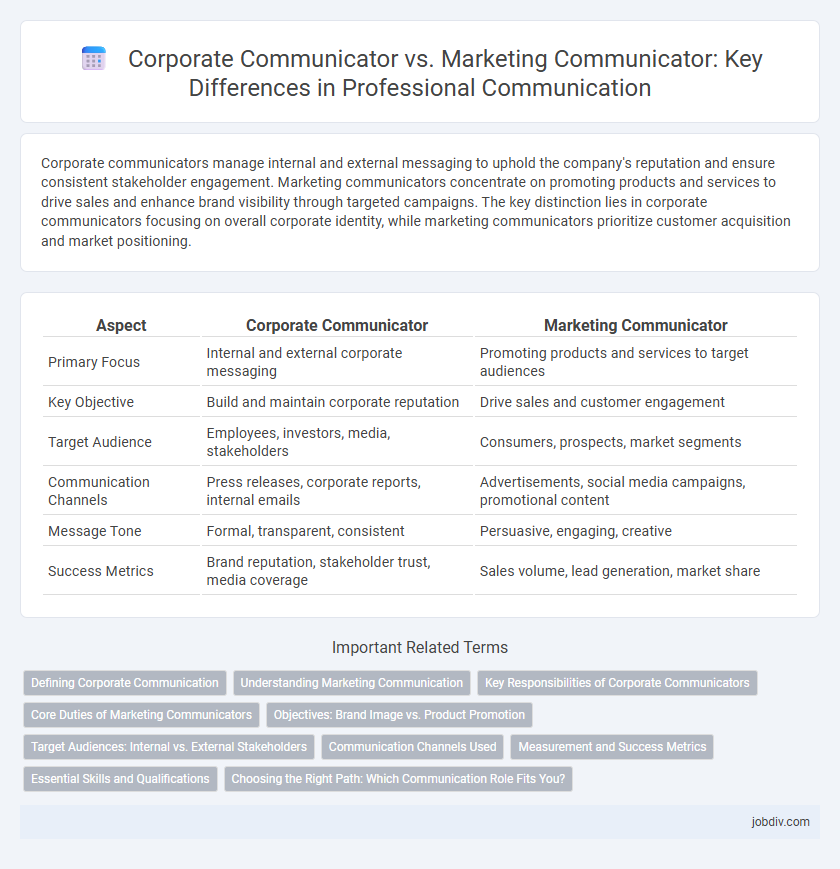Corporate communicators manage internal and external messaging to uphold the company's reputation and ensure consistent stakeholder engagement. Marketing communicators concentrate on promoting products and services to drive sales and enhance brand visibility through targeted campaigns. The key distinction lies in corporate communicators focusing on overall corporate identity, while marketing communicators prioritize customer acquisition and market positioning.
Table of Comparison
| Aspect | Corporate Communicator | Marketing Communicator |
|---|---|---|
| Primary Focus | Internal and external corporate messaging | Promoting products and services to target audiences |
| Key Objective | Build and maintain corporate reputation | Drive sales and customer engagement |
| Target Audience | Employees, investors, media, stakeholders | Consumers, prospects, market segments |
| Communication Channels | Press releases, corporate reports, internal emails | Advertisements, social media campaigns, promotional content |
| Message Tone | Formal, transparent, consistent | Persuasive, engaging, creative |
| Success Metrics | Brand reputation, stakeholder trust, media coverage | Sales volume, lead generation, market share |
Defining Corporate Communication
Corporate communication defines the strategic management of a company's message to internal and external stakeholders, emphasizing reputation, values, and organizational identity. Corporate communicators focus on aligning communication with corporate governance, crisis management, and employee engagement, ensuring consistency across all channels. Their role contrasts with marketing communicators who prioritize customer engagement, brand promotion, and sales-driven campaigns.
Understanding Marketing Communication
Marketing communicators specialize in crafting targeted messages that promote products or services to specific customer segments, utilizing tools such as advertising, social media, and content marketing. Corporate communicators focus on maintaining and enhancing the organization's overall reputation, managing internal and external communications, including crisis management and stakeholder engagement. Understanding marketing communication involves recognizing its role in driving sales growth, brand awareness, and customer loyalty through strategic messaging and integrated marketing channels.
Key Responsibilities of Corporate Communicators
Corporate communicators manage internal and external communications, ensuring consistent messaging that aligns with the company's mission and values. They handle crisis communication, employee engagement, public relations, and corporate social responsibility initiatives. Their role includes crafting press releases, speeches, and reports to maintain the organization's reputation and stakeholder trust.
Core Duties of Marketing Communicators
Marketing communicators specialize in crafting targeted messages that promote products or services to specific audiences through channels like advertising, social media, and email campaigns. Their core duties include market research analysis, brand positioning, content creation, and campaign performance tracking to maximize customer engagement and sales growth. Unlike corporate communicators who manage internal communications and corporate reputation, marketing communicators drive revenue by aligning messaging with consumer behavior and market trends.
Objectives: Brand Image vs. Product Promotion
Corporate communicators focus on shaping and maintaining a positive brand image by managing the company's reputation, internal communication, and stakeholder relationships. Marketing communicators prioritize product promotion through targeted campaigns that drive sales, customer engagement, and market awareness. While brand image fosters long-term trust and loyalty, product promotion aims for immediate consumer action and revenue growth.
Target Audiences: Internal vs. External Stakeholders
Corporate communicators primarily engage internal stakeholders such as employees, management, and board members to foster organizational alignment and culture. Marketing communicators focus on external audiences including customers, prospects, and industry influencers to drive brand awareness and sales. Understanding these distinct target audiences ensures tailored messaging that supports overall business objectives and stakeholder relationships.
Communication Channels Used
Corporate communicators primarily utilize internal communication channels such as intranets, company newsletters, and town hall meetings to engage employees and stakeholders effectively. Marketing communicators focus on external channels like social media platforms, email campaigns, and advertising to target customers and drive brand awareness. Both roles strategically select channels based on audience reach, message purpose, and engagement goals.
Measurement and Success Metrics
Corporate communicators measure success through metrics such as employee engagement, brand reputation, and media sentiment analysis, emphasizing internal alignment and stakeholder trust. Marketing communicators focus on conversion rates, customer acquisition cost, return on investment (ROI), and lead generation to gauge campaign effectiveness and market impact. Both roles rely on data-driven insights but apply distinct KPIs aligned with their strategic objectives in communication.
Essential Skills and Qualifications
Corporate communicators excel in strategic messaging, media relations, and stakeholder engagement, requiring expertise in crisis communication, internal communication platforms, and corporate social responsibility. Marketing communicators specialize in brand strategy, digital marketing, content creation, and data analytics to drive customer engagement and lead generation. Both roles demand strong writing, public speaking, and project management skills, while corporate communicators often hold qualifications in public relations or business communications, and marketing communicators typically possess credentials in marketing, advertising, or digital media.
Choosing the Right Path: Which Communication Role Fits You?
Corporate communicators focus on internal messaging, stakeholder relations, and crisis management to maintain organizational reputation and alignment. Marketing communicators drive brand awareness and sales by crafting persuasive campaigns targeting specific audiences and analyzing market trends. Selecting the right path depends on whether you prefer strategic relationship-building within a company or creative promotion aimed at external customers.
Corporate Communicator vs Marketing Communicator Infographic

 jobdiv.com
jobdiv.com